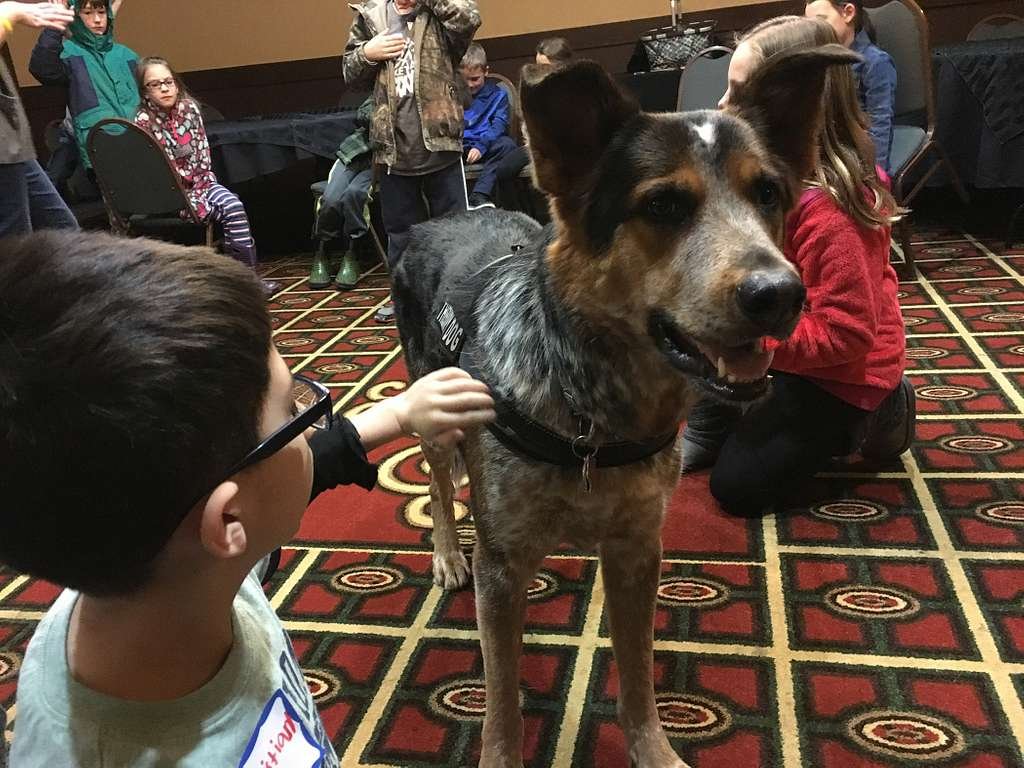Once upon a time, in the enchanting realm of companionship and care, there existed a magical bond between humans and their loyal furry friends. In this realm, where empathy reigned supreme, a special kind of puppy emerged—one with an extraordinary ability to provide unwavering emotional support to those in need. The path to harnessing this incredible power begins with training, where the key to unlocking their true potential lies. So, if you find yourself navigating the maze of emotional struggles and seek solace in the fluffy embrace of a faithful friend, join us as we embark on a journey to uncover the secrets to training a puppy for emotional support—the key to finding comfort, strength, and unwavering companionship in a chaotic world.
Table of Contents
- Setting Expectations for a Successful Emotional Support Puppy Training
- Building a Strong Bond with Your Puppy: Key to Emotional Support Training
- Effective Training Techniques to Promote Emotional Support Skills
- Creating a Supportive Environment: Tips for Nurturing Your Puppy’s Emotional Well-being
- Maintaining Consistency and Patience: Overcoming Challenges in Emotional Support Training
- Q&A
- Future Outlook

Setting Expectations for a Successful Emotional Support Puppy Training
Training an emotional support puppy can be a transformative experience not just for the pup, but also for you as their owner. However, it is crucial to set realistic expectations to ensure a successful journey. Here are some key points to keep in mind:
- Time commitment: Training a puppy requires time and effort. Be prepared to spend consistent, quality time with your furry companion to establish a strong bond and reinforce positive behaviors.
- Patience is paramount: Remember that puppies are like sponges, but they also have their limitations. Be patient with their learning process, as some skills may take longer to master than others. Keep the training sessions short and enjoyable to prevent frustration.
- Consistency is key: Set clear boundaries, rules, and routines for your puppy. Consistency helps them understand what is expected of them and reinforces good behavior. Make sure all family members are on the same page and follow the training plan.
- Reward-based training: Positive reinforcement is a powerful tool for training. Reward your puppy with treats, praise, or playtime when they display desired behaviors, as this encourages them to repeat those behaviors.
- Training beyond basics: While obedience training forms the foundation, consider taking it further by introducing your emotional support puppy to various social situations, environments, and stimuli. Gradual exposure will help them remain calm and well-behaved in different scenarios.
By setting realistic expectations and approaching emotional support puppy training with patience, consistency, and positive reinforcement, you are well on your way to developing a strong bond with your furry companion and enjoying a successful training journey together!

Building a Strong Bond with Your Puppy: Key to Emotional Support Training
Creating a strong bond with your puppy is not only essential for their overall well-being but also crucial for successful emotional support training. The depth of your relationship will greatly impact their ability to provide comfort and support when needed. Here are some key tips to help foster a strong bond with your furry companion:
- Quality Time: Spend dedicated time every day engaging in activities that your puppy enjoys. Whether it’s going for walks, playing fetch, or simply cuddling on the couch, be fully present and make these moments special.
- Positive Reinforcement: Reward your puppy for good behavior and respond to their needs promptly. Positive reinforcement, such as treats or praise, creates a positive association and strengthens the bond between you.
- Effective Communication: Learn to communicate effectively with your puppy by using consistent signals and body language. Understanding their needs and responding appropriately will build trust and improve your connection.
- Patient Training: Approach training sessions with patience and understanding. Keep in mind that your puppy is learning and growing, and mistakes are part of the process. Celebrate their successes and provide gentle guidance when they struggle.
Remember, building a strong bond with your puppy takes time and effort, but the rewards are immeasurable. The trust and emotional support they provide will greatly enhance your life and create a meaningful connection that lasts a lifetime.

Effective Training Techniques to Promote Emotional Support Skills
Developing strong emotional support skills is essential for individuals in various professions, such as therapists, counselors, and educators. These skills enable professionals to connect empathetically with others and offer the necessary support to enhance emotional well-being. Effective training techniques can further enhance these skills and improve the quality of care and support provided.
Here are some impactful training techniques to promote emotional support skills:
- Active Listening: Encourage trainees to focus on active listening techniques, such as maintaining eye contact, paraphrasing, and reflecting feelings. These skills help professionals understand and validate the emotions expressed by individuals seeking support, fostering a deeper connection.
- Empathy Building Exercises: Engaging in empathy-building exercises can encourage trainees to put themselves in others’ shoes, fostering empathy and understanding. These exercises may include role-playing scenarios, group discussions, or reflective journaling.
- Cultural Sensitivity: Promote training that emphasizes cultural sensitivity to ensure professionals can understand and adapt to diverse backgrounds and beliefs. Educate trainees about cultural norms and practices different from their own, helping them navigate any potential biases or misunderstandings.
- Self-Care Techniques: Recognize the importance of self-care in promoting emotional support skills. Trainees should learn techniques such as mindfulness, stress management, and maintaining work-life balance to prevent burnout and enhance their ability to provide effective support.
By incorporating these effective training techniques, professionals can enhance their emotional support skills, leading to more meaningful connections and improved well-being for those they serve.

Creating a Supportive Environment: Tips for Nurturing Your Puppy’s Emotional Well-being
Dogs, especially puppies, need a supportive environment to thrive emotionally. Here are some valuable tips to help you nurture your puppy’s emotional well-being:
-
Create a Safe Space: Establish a designated area where your puppy feels secure and can retreat to when feeling overwhelmed. This could be a cozy corner with a comfortable bed and some toys, providing a calming haven for your furry friend.
-
Positive Reinforcement: Use positive reinforcement techniques, such as treats, praise, and gentle strokes, to reward good behavior and reinforce the bond between you and your puppy. This fosters a sense of trust and confidence, ensuring a positive emotional experience for your pup.
-
Regular Socialization: Introduce your puppy to various situations, animals, and people in a controlled and positive manner. This exposure helps them build confidence, improves their social skills, and reduces the likelihood of anxiety or fear-based behaviors later in life.
- Consistent Routine: Dogs thrive on routine, as it provides them with predictability and stability. Establish a consistent schedule for meals, playtime, exercise, and rest, creating a structured environment that your puppy can rely on and feel comfortable in.
-
Engaging Playtime: Puppies have boundless energy and need regular opportunities for physical and mental stimulation. Engage in interactive play sessions, provide engaging toys, and vary their activities to keep them mentally and physically stimulated, ensuring a happy and well-rounded puppy.
By implementing these tips, you can create a supportive and nurturing environment that promotes your puppy’s emotional well-being, allowing them to grow into a happy, confident, and well-adjusted adult dog. Remember, a content and emotionally healthy puppy is a cherished companion who will bring endless joy to your life!
Maintaining Consistency and Patience: Overcoming Challenges in Emotional Support Training
Effective emotional support training involves overcoming various challenges that require consistency and patience from both trainers and trainees. As the journey to becoming a compassionate and proficient emotional support provider unfolds, it is essential to address these challenges head-on and find solutions that reinforce the training process.
1. Building trust: Developing trust is crucial for effective emotional support training. Trainees must feel comfortable sharing their emotions and vulnerabilities in order to learn the necessary skills. It is important for trainers to create a safe and non-judgmental environment that encourages open communication.
2. Managing personal biases: Emotional support training requires individuals to set aside their own biases and provide unbiased support. Trainees may face challenges in recognizing and overcoming their personal biases, which can hinder their ability to offer empathetic and non-judgmental support. Overcoming these biases requires self-reflection and an openness to learning from diverse perspectives.
3. Consistency and practice: Emotional support training is an ongoing process that requires consistency and regular practice. To overcome challenges and develop expertise, trainees must dedicate themselves to continuous learning and improvement. Practicing active listening, empathy, and other essential skills regularly will help solidify the training and allow trainees to become confident emotional support providers.
Q&A
Q: How can I train a puppy to be an emotional support animal?
A: Training a puppy for emotional support involves positive reinforcement techniques such as reward-based training and socialization. Start with basic obedience commands, gradually exposing the puppy to various environments, people, and animals.
Q: What are the benefits of having a puppy as an emotional support animal?
A: Puppies have an innate ability to bring comfort and joy, helping to alleviate symptoms of anxiety and stress. Their playful nature and unconditional love can improve your mood and provide a sense of companionship.
Q: Is there a specific breed that is better suited for emotional support work?
A: While certain breeds may have natural characteristics that make them well-suited for emotional support work, it ultimately depends on the individual puppy’s temperament, training, and compatibility with your needs.
Q: How can I socialize my puppy for emotional support work?
A: Socialization is key to ensure a well-rounded emotional support puppy. Expose them to different environments, people, and animals, allowing them to experience a wide range of situations in a positive and controlled manner.
Q: Can I train my puppy to provide specific emotional support tasks?
A: Yes, you can train your puppy to perform specific tasks that assist with emotional support, such as deep pressure therapy, fetching medication, or providing grounding techniques. Consult with a professional dog trainer or therapist to guide you through this process.
Q: How long does it typically take to train a puppy for emotional support?
A: The duration of training varies depending on the puppy’s breed, temperament, and previous experiences. Consistency and patience are key factors, but it generally takes several months to a year to fully train a reliable and certified emotional support animal.
Q: Can professional assistance be helpful in training a puppy for emotional support?
A: Absolutely! Enlisting the help of a professional dog trainer or therapist can greatly enhance the training process. They have the expertise to guide you through the necessary steps, address any challenges, and ensure that your puppy becomes an effective emotional support animal.
Q: Are there any legal requirements or certifications for a puppy to be an emotional support animal?
A: Unlike service animals, emotional support animals do not require specific certifications. However, some airlines and housing providers may require documentation from a mental health professional to allow your puppy to accompany you or live with you as an emotional support animal.
Q: How can I ensure that my puppy’s emotional needs are met while training them for emotional support?
A: It is vital to prioritize your puppy’s emotional well-being throughout the training process. Provide them with ample love, attention, mental stimulation, and regular breaks to play and rest. Regular veterinary check-ups are also crucial to assess their health and address any concerns.
Future Outlook
As your pup completes their emotional support training journey, a world of newfound possibilities opens up. The bond you have forged together will serve as a guiding light through life’s ups and downs, offering solace and companionship when it’s needed most. Remember, this journey is not only about training your puppy, but also about discovering your own capacity for empathy, patience, and love.
As you bid farewell to this article, may you carry with you the knowledge that you are not alone in this beautiful endeavor. Your journey as a puppy parent will undoubtedly be filled with countless heartwarming moments, laughter, and unwavering loyalty. And as your furry companion grows into their role as an emotional support animal, they will become a constant source of comfort, a trusted confidant, and a fierce protector of your well-being.
Embrace this opportunity to create a sanctuary of love and understanding for yourself and your puppy. Cherish the moments you spend together, for they will become the foundation upon which you build a lifetime of cherished memories. Your puppy’s presence will not only bring joy and warmth to your heart but will also provide you with the strength to face life’s tribulations with renewed courage and resilience.
It is our hope that through this article, you have gained insights and tools to navigate the intricacies of training a puppy for emotional support. The journey may have had its fair share of challenges, but the rewards of a loyal and loving companion will far outweigh any initial difficulties.
As you embark on this incredible adventure, remember to always be patient, compassionate, and understanding towards your puppy. In their presence, you will find a steadfast source of support and unwavering devotion that will brighten even the darkest of days.
So, go forth, puppy parent, and cherish the extraordinary bond you have nurtured. May it bring you comfort in times of distress, build resilience during life’s trials, and foster a profound sense of happiness and fulfillment as you navigate the world together. Training a puppy for emotional support is no ordinary feat, but rest assured, the rewards are immeasurable.
As an affiliate, my content may feature links to products I personally use and recommend. By taking action, like subscribing or making a purchase, you’ll be supporting my work and fueling my taco cravings at the same time. Win-win, right?
Want to read more? Check out our Affiliate Disclosure page.